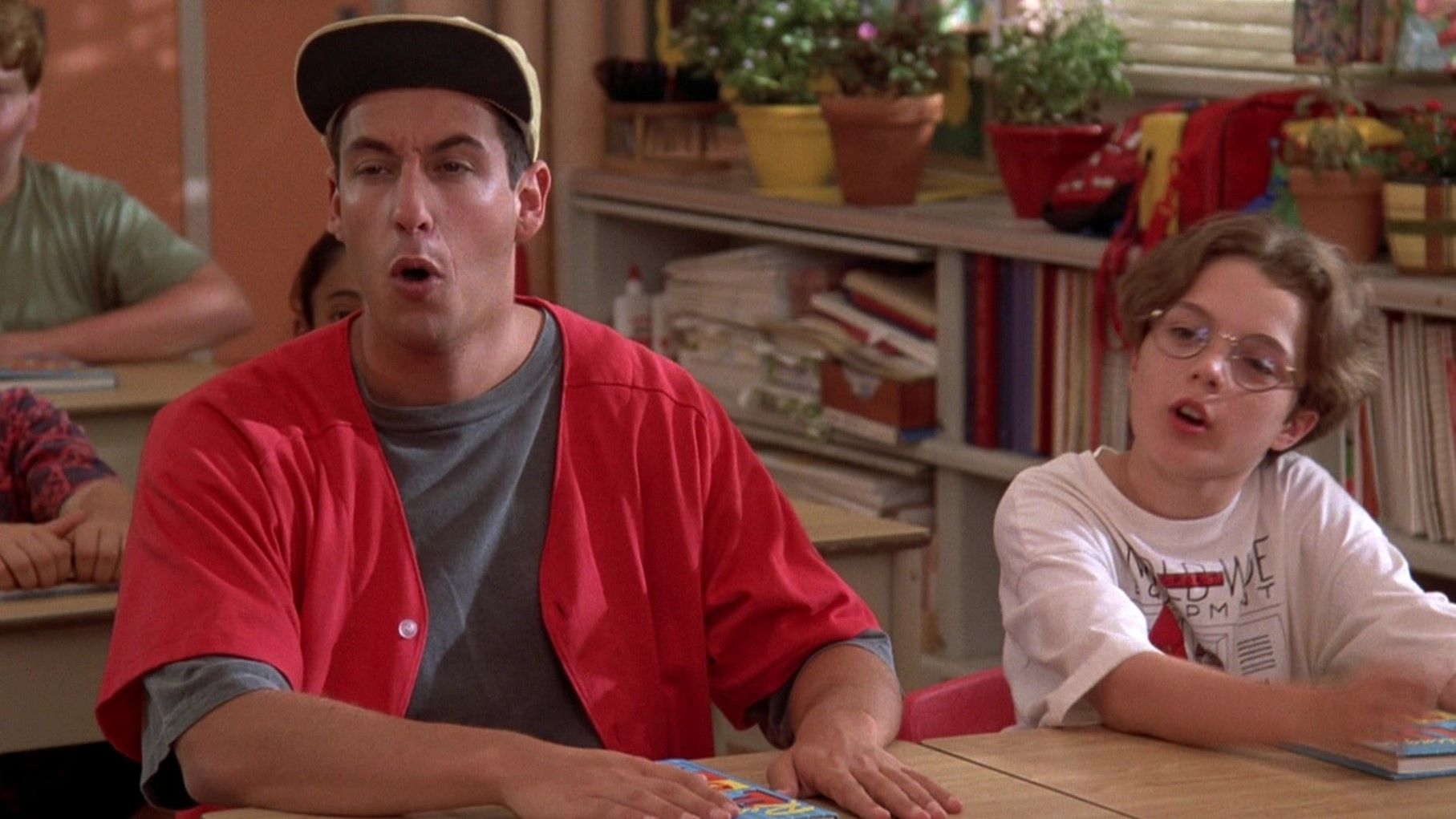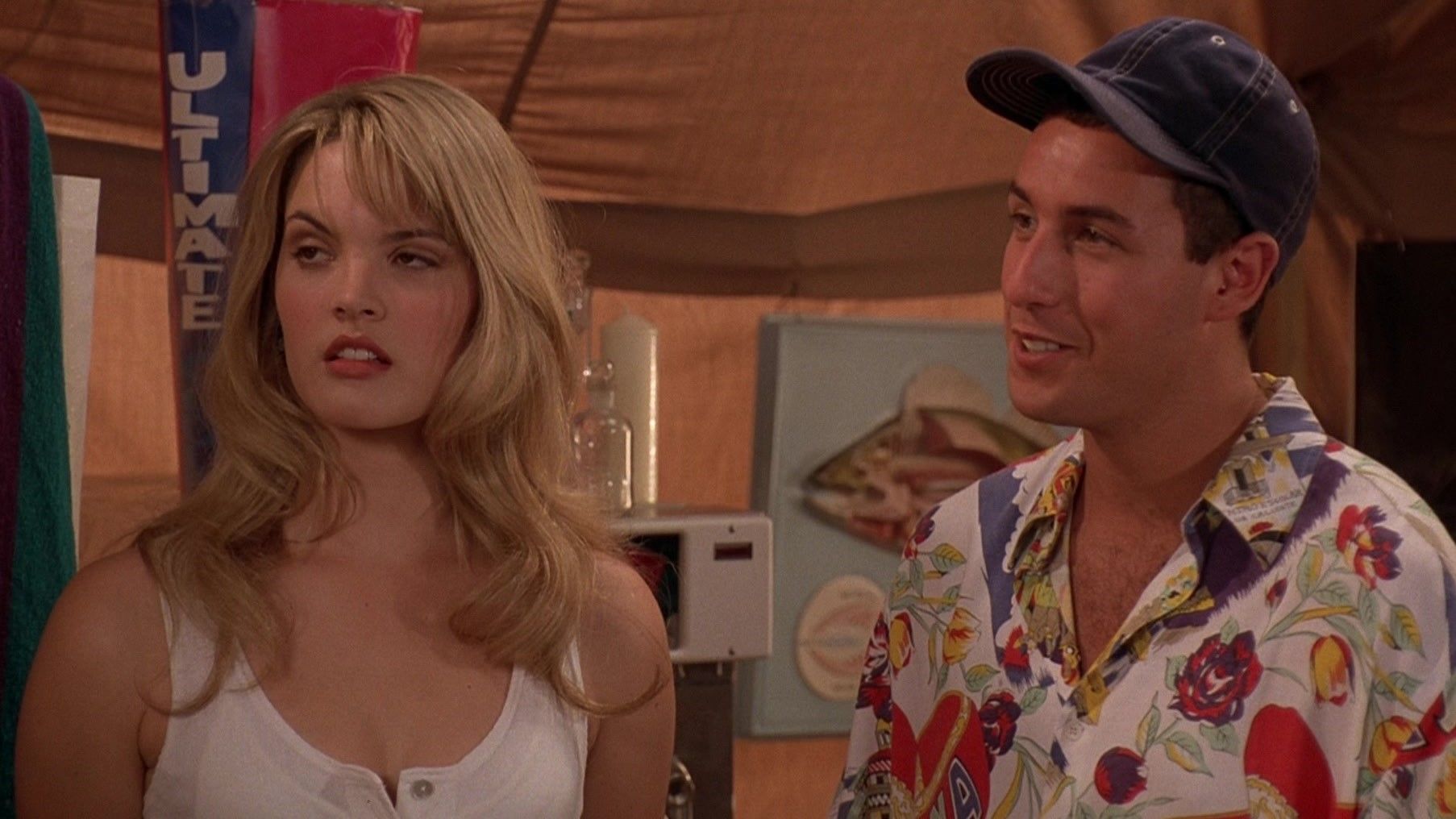Chris Farley Funny Pic in Billy Madison
'Billy Madison' Isn't Just Funny — It's a Surrealist Masterpiece
Billy Madison remains as pure and elemental a distillation of middle-school humor as any studio comedy from the last 30 years.
The arc of Adam Sandler's career is both fascinating, and also more deceptively complex than one might initially think at the outset. As any Sandman scholar can tell you, there is a noticeable creative shift that occurs shortly following the theatrical release of the comedy superstar's 2000 cult item, Little Nicky . It's not that Little Nicky is the best or most memorable Adam Sandler movie; it's more that Steven Brill's underappreciated, critically maligned stoner-headbanger fantasy-farce is genuinely, unapologetically weird: weird in a way that, with a few exceptions, Sandler's movies never were again.
Much has been written about how supposedly lowbrow Mr. Sandler's output is. Not enough has been written, at least in this writer's opinion, about the aggressive strain of lunatic surreality that defines his most lasting work. One can see traces of the anarchy of the Marx Brothers, or the surly misanthropy of W.C. Fields, in Sandler's landmark comedies. Sandler's early classic LPs, They're All Gonna Laugh At You! and What The Hell Happened To Me?, are the textbook definition of puerile absurdity. They're also, for the record, both extremely funny, though you probably wouldn't want to listen to them with your family or your kids.
Occasionally, since Little Nicky, Sandler has dared to get weird again. Alas, as his films have become more popular and his standing in the comedy community has changed with the years, the plots of his movies have subsequently become more grounded in the quote-unquote real world. Particularly in the wake of the transitional box office success of Big Daddy , Sandler hit upon yet another lucrative movie-star formula: casting himself as a moody, wisecracking, lovable schmuck-Everyman who is either pining for love and a family, or already a part of one.

Alas, we're not here to talk about Little Nicky, or even Big Daddy, for that matter. We're here to talk about Billy Madison , which is arguably Sandler's funniest and most inspired work on the whole. It is certainly, without question, the apex of Adam Sandler at his weirdest.
Billy Madison, unlike more ostensibly "mature" Sandman efforts like The Wedding Singer , Mr. Deeds , or Anger Management , does not take place in the real world, or even in a dude-bro movie fantasy land that is being passed off as the real world. The internal logic of Billy Madison is practically extraterrestrial, and as divorced from so-called "reality" as the classic satires of Luis Bunuel. One imagines that the Exterminating Angel auteur wouldn't have blinked an eye at scenes such as the one that features Sandler's stunted rich-boy dufus Billy hallucinating a gigantic, menacing penguin in a bleary alcoholic haze; ditto for a prolonged sequence wherein Billy converses with his father's business associates in gibberish. This is a film where a clown on stilts falls to a bloody, brutal death... at a children's birthday party. Again, this is a studio comedy we're talking about. Later, there will be an elaborately choreographed musical number wherein that same clown comes back to life, without explanation.
Have any of Sandler's other movies ever flirted with this level of Dada-baiting silliness? Yes and no. A lot of it comes down to the place Sandler was at in his career when he decided that Billy would be his first star vehicle. Sandler had certainly made his mark on Saturday Night Live , where his boy-next-door charm, along with the idiosyncratic characters he created, won him a nascent fan base. Even amongst his contemporaries at the time — stand-ups like Chris Rock and David Spade, and of course, the late, great Chris Farley — there was always something special about Sandler. Stardom seemed imminent for him. Alas, Going Overboard , the actor's first semi-official lead vehicle, wasn't going to be the movie that put the Sandman on the map. While Going Overboard movie is plenty absurd in its own right, it's also a scattered mess, and an ungainly fit for the talents of its star, who was clearly destined for bigger things.

Sandler penned Billy Madison with day-one writing partner Tim Herlihy, whom he met when the pair were roommates at NYU. The two bonded quickly over a shared taste in comedy, and Herlihy ended up following Sandler to SNL, where he co-wrote some of the star's more memorably depraved sketches. Sandler and Herlihy honed an infantile but nevertheless suis-generis sensibility on Sandler's first comedy record, They're All Gonna Laugh At You! To a degree, Billy Madison is informed by the same warped, proudly juvenile attitude as that album, which was unfiltered, uncompromising, and unencumbered by any extraneous creative oversight, meaning Sandler was free to record tracks with titles like "The Longest Pee" and "The Severe Beating Of A High School Science Teacher." Like that album, Billy Madison remains as pure and elemental a distillation of middle-school humor as any studio comedy from the last thirty years, meaning it is ultimately resistant to highbrow critical interpretation.
In a way, Billy Madison feels as whimsically fanciful as a Jacques Tati picture, albeit one with more urine-focused gags, Styx needle drops, and Norm Macdonald one-liners. Billy, Sandler's titular goofball heir, is a spoiled idiot who lives in a hermetic bubble of privilege at his father's vast and lavish estate. His life is practically a cartoon: a winking, albeit grotesque parody of All-American excess. As such, Billy's aimless days are spent binge-drinking, laying by the pool, and sifting through his beloved "nudie magazines."
The central plot engine here is one that's been integral to many other Sandler comedies over the years: in order to earn the respect of his peers, our bumbling hero must rise to the occasion, embrace responsibility and hard work, and in the end, silence his naysayers. What exactly does "hard work" translate to, in this context? In Billy Madison, it involves a 27-year-old trust fund goon repeating grades K-12, with two weeks to finish each grade. If he's successful, Billy will inherit his tycoon father's Fortune 500 company, thus saving it from falling into the hands of his dad's sniveling, unctuous corporate colleague, Eric (Bradley Whitford, who does "sniveling" and "unctuous" better than most).
Already, this is a premise ripe with satirical subtext. To Billy's jaded dad, wealth is merely a game — it's such a game, in fact, that the elder Madison is willing to wager a literal fortune that his incompetent alcoholic son can perform in a meaningless and ultimately self-imposed series of trials, as a substitution for the requisite training, hours, and relationship-building that such an endeavor would realistically require in real life. Once again, it should be re-iterated that Billy Madison wants nothing to do with real life. One of the charms of Sandler and Herlihy's wackadoodle screenplay is that we are encouraged to belief in Billy's daffy dream, despite the fact that this well-adjusted charmer's idea of a nice night out involves lighting bags of dog feces aflame after placing them on the porches of senior citizens.

Chuckling over the ins and outs of assorted bodily functions aside, the humor in Billy Madison isn't so much gross in the Farrelly Brothers vein as it is straight-up bizarre. The film is generously packed with gloriously illogical gags and hilariously inexplicable recurring bits, each one more out-there than the next. It's a movie that features Sandler's pal Chris Farley as a rageaholic bus driver who steals children's school lunches, an amateur wrestler who calls himself "The Revolting Blob," Sandler literally reciting William Shakespeare, and a terrifying throwaway gag where a man is casually set on fire.
These are not the kinds of lazy, low-hanging jokes that Sandler has been accused of making in the past. Not only is Billy Madison legitimately unhinged, it's also a) arguably the most creatively inspired mainstream comedy that Sandler ever made, and b) the movie that has the most to say about its star's screen sensibility.
Late in the film, after being harangued relentlessly by a family of red-headed bullies known as the O' Doyles, Sandler throws a taunt back at a high-school-aged O' Doyle that, via Sandler's offhanded delivery, feels like a curse, or a spell being cast. It's a throwaway moment of nutty frivolity that, like so much else in Billy Madison, is shot through with a surprisingly dark undertow. Later, we see the entire O' Doyle family drive off a cliff and die a fiery death, and we are encouraged to laugh heartily. Like I said earlier: legitimately unhinged. Good taste and shame be damned, that's just the kind of comedy masterwork Billy Madison is.
Sandler has obviously made some very funny, very worthy comedies since Billy Madison, but none that have recaptured the maniac spark of inspiration that informs every scene of his debut vehicle. There is a certain kind of purity, after all, that comes with a great artist fashioning their first major statement. Within this space, the artist has no one to answer to. There are no expectations that are being thrust upon them. They are entirely free to create in their own way. Adam Sandler, when left to his own devices, gave us dodgeball montages, class critique, and Snack Pack obsessions. All these years later, and Billy Madison is still an inimitable salvo of American idiocy: a symphony of surreal, slaphappy genius whose enduring appeal only grows with each passing year.
whiteleggehopearabits.blogspot.com
Source: https://collider.com/billy-madison-why-its-good-surrealist-masterpiece/

0 Response to "Chris Farley Funny Pic in Billy Madison"
Post a Comment